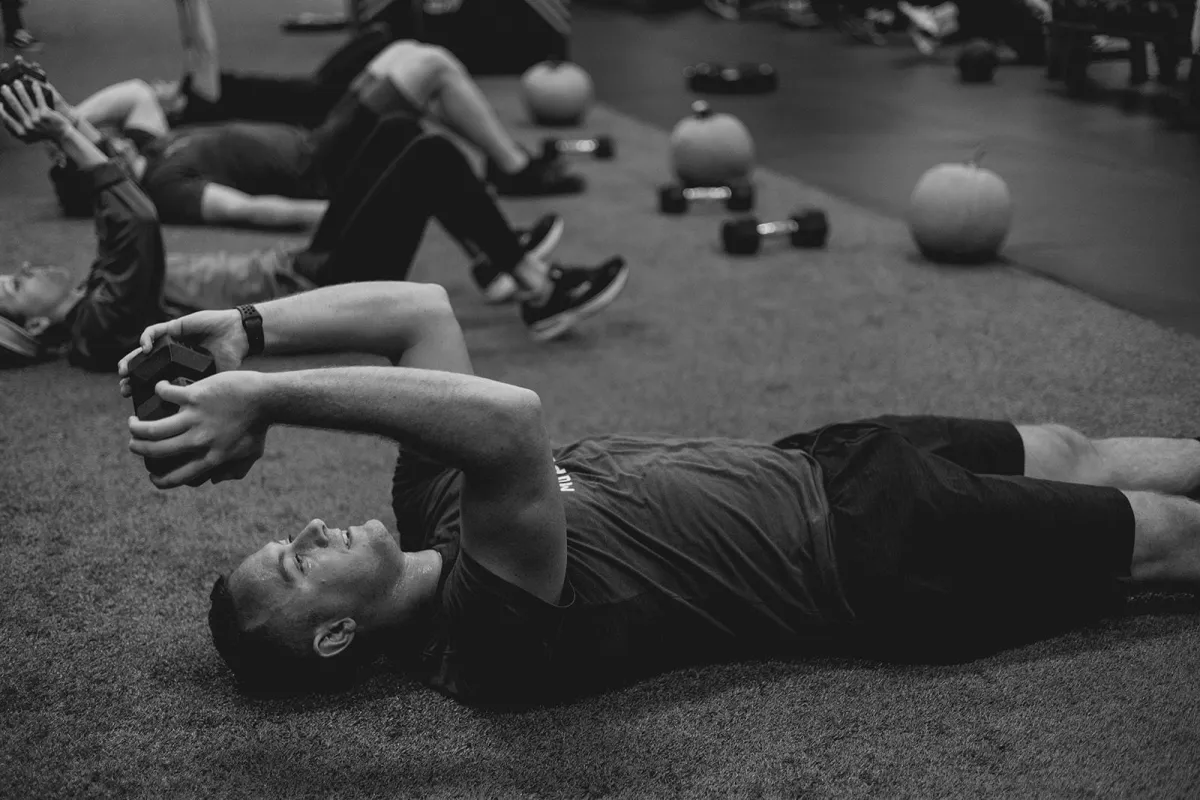Fitness Blogs

The Fountain of Youth: Exercise for Longevity and Quality of Life
Studies have shown that regular vigorous exercise can be the key to unlocking an additional 20 years of life. Yes, you heard that right – 20 years!
Picture this:
You're strolling through the park, laughing with friends, and feeling like you're in the prime of your life. As you breathe in the fresh air, you can't help but marvel at how energetic and vibrant you feel. It's like you've discovered the elusive fountain of youth, and it's all thanks to one powerful elixir – exercise.

You see, studies have shown that regular vigorous exercise can be the key to unlocking an additional 20 years of life. Yes, you heard that right – 20 years! It's like adding a bonus level to your life, and it's not just about living longer; You’re not trying to just be here but unable it's about living better.
Research has revealed that engaging in 3-4 days of vigorous exercise can offset all-cause mortality, meaning it reduces the risk of premature death from various causes. It's like a mushroom to Mario, a power-up for your body, protecting you from the villains of illness and chronic diseases, and those pesky Gompas
One of the other remarkable effects of exercise is its impact on your brain’s health. A study published in the Journal of Alzheimer's Disease found that regular physical activity can significantly reduce the risk of Alzheimer's and other forms of dementia. Exercise is like a shield, safeguarding your precious memories and preserving your cognitive function as you age.
As we age, our brains naturally undergo changes in structure and function. Neuroplasticity, the brain's remarkable ability to adapt and reorganize itself, plays a vital role in learning, memory, and overall cognitive function. Exercise serves as a powerful catalyst for neuroplasticity, enhancing the brain's ability to create new neural connections and pathways.
A study conducted by the University of Illinois at Urbana-Champaign revealed that engaging in exercise, even that such as running or brisk walking, can lead to significant improvements in cognitive function. Participants who participated in regular exercise showed enhanced attention, memory, and processing speed compared to their sedentary counterparts.
Furthermore, exercise stimulates the release of brain-derived neurotrophic factor (BDNF), a protein crucial for brain health. BDNF supports the survival of existing neurons and encourages the growth of new neurons and synapses, promoting neuroplasticity and improving learning and memory.
But the benefits don't stop there. Exercise has been shown to boost mood and alleviate stress and anxiety. Cortisol, the infamous stress hormone, can indeed wreak havoc on our bodies and minds. When not properly managed, it can leave us feeling overwhelmed, anxious, and downright exhausted. But fear not, for science has unveiled a remarkable discovery – the cortisol blunting effect of exercise.
Now, here's the fascinating part – the cortisol blunting effect of exercise is not a one-size-fits-all phenomenon. It's a dose-dependent response. In other words, the intensity of your exercise directly influences the magnitude of cortisol blunting you experience.
Research has shown that engaging in regular morning exercise can significantly reduce cortisol levels throughout the day. But it's not just about engaging in any exercise – it's about finding the right intensity that works for you to improve overall health and stress levels.
A study conducted by the American College of Sports Medicine explored the impact of exercise timing on cortisol response. Participants who worked out early in the morning experienced a blunted cortisol response to stressful events later in the day compared to those who hadn't exercised. It's like giving your mind a suit of armor to deflect stress's arrows, leaving you feeling more composed and in control. That’s not to say you can’t work out in the evening and reduce the feelings of stress from the day. Research has shown that regular exercise later in the day can help reduce cortisol levels too, leading to better sleep and a more relaxed mind. So it’s all about finding the strategies that work for you to experience a little more zen moments amidst the chaos of life.
You sold yet on the benefits and why you absolutely should be exercising regularly in your life!
No, well I’ll quote the infomercial greats, “But wait there’s more”
Exercise proves to be a formidable adversary against cancer. According to the American Cancer Society, regular physical activity has been linked to a reduced risk of several types of cancer, including breast, colon, and prostate cancers. It's like giving cancer a knockout punch before it even has a chance to take you down.
As you grow older, maintaining muscle mass becomes vital to your overall well-being. Studies have shown that a decrease in muscle mass can lead to an increased risk of falls, injuries, and delayed recovery. By incorporating strength training and regular exercise into your routine, you're fortifying your body against potential mishaps, ensuring you stay agile and resilient.
For those in their 50s to 80s, exercise is an absolute game-changer. It's the secret weapon to staying youthful and independent as the years go by. Embracing a consistent exercise regimen not only enhances your physical capabilities but also boosts your mental and emotional well-being. It's like having a trusty sidekick to navigate the ups and downs of life with confidence and positivity.
Other resources
Recovery Blogs

The Fountain of Youth: Exercise for Longevity and Quality of Life
Studies have shown that regular vigorous exercise can be the key to unlocking an additional 20 years of life. Yes, you heard that right – 20 years!
Picture this:
You're strolling through the park, laughing with friends, and feeling like you're in the prime of your life. As you breathe in the fresh air, you can't help but marvel at how energetic and vibrant you feel. It's like you've discovered the elusive fountain of youth, and it's all thanks to one powerful elixir – exercise.

You see, studies have shown that regular vigorous exercise can be the key to unlocking an additional 20 years of life. Yes, you heard that right – 20 years! It's like adding a bonus level to your life, and it's not just about living longer; You’re not trying to just be here but unable it's about living better.
Research has revealed that engaging in 3-4 days of vigorous exercise can offset all-cause mortality, meaning it reduces the risk of premature death from various causes. It's like a mushroom to Mario, a power-up for your body, protecting you from the villains of illness and chronic diseases, and those pesky Gompas
One of the other remarkable effects of exercise is its impact on your brain’s health. A study published in the Journal of Alzheimer's Disease found that regular physical activity can significantly reduce the risk of Alzheimer's and other forms of dementia. Exercise is like a shield, safeguarding your precious memories and preserving your cognitive function as you age.
As we age, our brains naturally undergo changes in structure and function. Neuroplasticity, the brain's remarkable ability to adapt and reorganize itself, plays a vital role in learning, memory, and overall cognitive function. Exercise serves as a powerful catalyst for neuroplasticity, enhancing the brain's ability to create new neural connections and pathways.
A study conducted by the University of Illinois at Urbana-Champaign revealed that engaging in exercise, even that such as running or brisk walking, can lead to significant improvements in cognitive function. Participants who participated in regular exercise showed enhanced attention, memory, and processing speed compared to their sedentary counterparts.
Furthermore, exercise stimulates the release of brain-derived neurotrophic factor (BDNF), a protein crucial for brain health. BDNF supports the survival of existing neurons and encourages the growth of new neurons and synapses, promoting neuroplasticity and improving learning and memory.
But the benefits don't stop there. Exercise has been shown to boost mood and alleviate stress and anxiety. Cortisol, the infamous stress hormone, can indeed wreak havoc on our bodies and minds. When not properly managed, it can leave us feeling overwhelmed, anxious, and downright exhausted. But fear not, for science has unveiled a remarkable discovery – the cortisol blunting effect of exercise.
Now, here's the fascinating part – the cortisol blunting effect of exercise is not a one-size-fits-all phenomenon. It's a dose-dependent response. In other words, the intensity of your exercise directly influences the magnitude of cortisol blunting you experience.
Research has shown that engaging in regular morning exercise can significantly reduce cortisol levels throughout the day. But it's not just about engaging in any exercise – it's about finding the right intensity that works for you to improve overall health and stress levels.
A study conducted by the American College of Sports Medicine explored the impact of exercise timing on cortisol response. Participants who worked out early in the morning experienced a blunted cortisol response to stressful events later in the day compared to those who hadn't exercised. It's like giving your mind a suit of armor to deflect stress's arrows, leaving you feeling more composed and in control. That’s not to say you can’t work out in the evening and reduce the feelings of stress from the day. Research has shown that regular exercise later in the day can help reduce cortisol levels too, leading to better sleep and a more relaxed mind. So it’s all about finding the strategies that work for you to experience a little more zen moments amidst the chaos of life.
You sold yet on the benefits and why you absolutely should be exercising regularly in your life!
No, well I’ll quote the infomercial greats, “But wait there’s more”
Exercise proves to be a formidable adversary against cancer. According to the American Cancer Society, regular physical activity has been linked to a reduced risk of several types of cancer, including breast, colon, and prostate cancers. It's like giving cancer a knockout punch before it even has a chance to take you down.
As you grow older, maintaining muscle mass becomes vital to your overall well-being. Studies have shown that a decrease in muscle mass can lead to an increased risk of falls, injuries, and delayed recovery. By incorporating strength training and regular exercise into your routine, you're fortifying your body against potential mishaps, ensuring you stay agile and resilient.
For those in their 50s to 80s, exercise is an absolute game-changer. It's the secret weapon to staying youthful and independent as the years go by. Embracing a consistent exercise regimen not only enhances your physical capabilities but also boosts your mental and emotional well-being. It's like having a trusty sidekick to navigate the ups and downs of life with confidence and positivity.
Other resources
Mindset Blogs

The Fountain of Youth: Exercise for Longevity and Quality of Life
Studies have shown that regular vigorous exercise can be the key to unlocking an additional 20 years of life. Yes, you heard that right – 20 years!
Picture this:
You're strolling through the park, laughing with friends, and feeling like you're in the prime of your life. As you breathe in the fresh air, you can't help but marvel at how energetic and vibrant you feel. It's like you've discovered the elusive fountain of youth, and it's all thanks to one powerful elixir – exercise.

You see, studies have shown that regular vigorous exercise can be the key to unlocking an additional 20 years of life. Yes, you heard that right – 20 years! It's like adding a bonus level to your life, and it's not just about living longer; You’re not trying to just be here but unable it's about living better.
Research has revealed that engaging in 3-4 days of vigorous exercise can offset all-cause mortality, meaning it reduces the risk of premature death from various causes. It's like a mushroom to Mario, a power-up for your body, protecting you from the villains of illness and chronic diseases, and those pesky Gompas
One of the other remarkable effects of exercise is its impact on your brain’s health. A study published in the Journal of Alzheimer's Disease found that regular physical activity can significantly reduce the risk of Alzheimer's and other forms of dementia. Exercise is like a shield, safeguarding your precious memories and preserving your cognitive function as you age.
As we age, our brains naturally undergo changes in structure and function. Neuroplasticity, the brain's remarkable ability to adapt and reorganize itself, plays a vital role in learning, memory, and overall cognitive function. Exercise serves as a powerful catalyst for neuroplasticity, enhancing the brain's ability to create new neural connections and pathways.
A study conducted by the University of Illinois at Urbana-Champaign revealed that engaging in exercise, even that such as running or brisk walking, can lead to significant improvements in cognitive function. Participants who participated in regular exercise showed enhanced attention, memory, and processing speed compared to their sedentary counterparts.
Furthermore, exercise stimulates the release of brain-derived neurotrophic factor (BDNF), a protein crucial for brain health. BDNF supports the survival of existing neurons and encourages the growth of new neurons and synapses, promoting neuroplasticity and improving learning and memory.
But the benefits don't stop there. Exercise has been shown to boost mood and alleviate stress and anxiety. Cortisol, the infamous stress hormone, can indeed wreak havoc on our bodies and minds. When not properly managed, it can leave us feeling overwhelmed, anxious, and downright exhausted. But fear not, for science has unveiled a remarkable discovery – the cortisol blunting effect of exercise.
Now, here's the fascinating part – the cortisol blunting effect of exercise is not a one-size-fits-all phenomenon. It's a dose-dependent response. In other words, the intensity of your exercise directly influences the magnitude of cortisol blunting you experience.
Research has shown that engaging in regular morning exercise can significantly reduce cortisol levels throughout the day. But it's not just about engaging in any exercise – it's about finding the right intensity that works for you to improve overall health and stress levels.
A study conducted by the American College of Sports Medicine explored the impact of exercise timing on cortisol response. Participants who worked out early in the morning experienced a blunted cortisol response to stressful events later in the day compared to those who hadn't exercised. It's like giving your mind a suit of armor to deflect stress's arrows, leaving you feeling more composed and in control. That’s not to say you can’t work out in the evening and reduce the feelings of stress from the day. Research has shown that regular exercise later in the day can help reduce cortisol levels too, leading to better sleep and a more relaxed mind. So it’s all about finding the strategies that work for you to experience a little more zen moments amidst the chaos of life.
You sold yet on the benefits and why you absolutely should be exercising regularly in your life!
No, well I’ll quote the infomercial greats, “But wait there’s more”
Exercise proves to be a formidable adversary against cancer. According to the American Cancer Society, regular physical activity has been linked to a reduced risk of several types of cancer, including breast, colon, and prostate cancers. It's like giving cancer a knockout punch before it even has a chance to take you down.
As you grow older, maintaining muscle mass becomes vital to your overall well-being. Studies have shown that a decrease in muscle mass can lead to an increased risk of falls, injuries, and delayed recovery. By incorporating strength training and regular exercise into your routine, you're fortifying your body against potential mishaps, ensuring you stay agile and resilient.
For those in their 50s to 80s, exercise is an absolute game-changer. It's the secret weapon to staying youthful and independent as the years go by. Embracing a consistent exercise regimen not only enhances your physical capabilities but also boosts your mental and emotional well-being. It's like having a trusty sidekick to navigate the ups and downs of life with confidence and positivity.
Other resources
AOM Blogs

The Fountain of Youth: Exercise for Longevity and Quality of Life
Studies have shown that regular vigorous exercise can be the key to unlocking an additional 20 years of life. Yes, you heard that right – 20 years!
Picture this:
You're strolling through the park, laughing with friends, and feeling like you're in the prime of your life. As you breathe in the fresh air, you can't help but marvel at how energetic and vibrant you feel. It's like you've discovered the elusive fountain of youth, and it's all thanks to one powerful elixir – exercise.

You see, studies have shown that regular vigorous exercise can be the key to unlocking an additional 20 years of life. Yes, you heard that right – 20 years! It's like adding a bonus level to your life, and it's not just about living longer; You’re not trying to just be here but unable it's about living better.
Research has revealed that engaging in 3-4 days of vigorous exercise can offset all-cause mortality, meaning it reduces the risk of premature death from various causes. It's like a mushroom to Mario, a power-up for your body, protecting you from the villains of illness and chronic diseases, and those pesky Gompas
One of the other remarkable effects of exercise is its impact on your brain’s health. A study published in the Journal of Alzheimer's Disease found that regular physical activity can significantly reduce the risk of Alzheimer's and other forms of dementia. Exercise is like a shield, safeguarding your precious memories and preserving your cognitive function as you age.
As we age, our brains naturally undergo changes in structure and function. Neuroplasticity, the brain's remarkable ability to adapt and reorganize itself, plays a vital role in learning, memory, and overall cognitive function. Exercise serves as a powerful catalyst for neuroplasticity, enhancing the brain's ability to create new neural connections and pathways.
A study conducted by the University of Illinois at Urbana-Champaign revealed that engaging in exercise, even that such as running or brisk walking, can lead to significant improvements in cognitive function. Participants who participated in regular exercise showed enhanced attention, memory, and processing speed compared to their sedentary counterparts.
Furthermore, exercise stimulates the release of brain-derived neurotrophic factor (BDNF), a protein crucial for brain health. BDNF supports the survival of existing neurons and encourages the growth of new neurons and synapses, promoting neuroplasticity and improving learning and memory.
But the benefits don't stop there. Exercise has been shown to boost mood and alleviate stress and anxiety. Cortisol, the infamous stress hormone, can indeed wreak havoc on our bodies and minds. When not properly managed, it can leave us feeling overwhelmed, anxious, and downright exhausted. But fear not, for science has unveiled a remarkable discovery – the cortisol blunting effect of exercise.
Now, here's the fascinating part – the cortisol blunting effect of exercise is not a one-size-fits-all phenomenon. It's a dose-dependent response. In other words, the intensity of your exercise directly influences the magnitude of cortisol blunting you experience.
Research has shown that engaging in regular morning exercise can significantly reduce cortisol levels throughout the day. But it's not just about engaging in any exercise – it's about finding the right intensity that works for you to improve overall health and stress levels.
A study conducted by the American College of Sports Medicine explored the impact of exercise timing on cortisol response. Participants who worked out early in the morning experienced a blunted cortisol response to stressful events later in the day compared to those who hadn't exercised. It's like giving your mind a suit of armor to deflect stress's arrows, leaving you feeling more composed and in control. That’s not to say you can’t work out in the evening and reduce the feelings of stress from the day. Research has shown that regular exercise later in the day can help reduce cortisol levels too, leading to better sleep and a more relaxed mind. So it’s all about finding the strategies that work for you to experience a little more zen moments amidst the chaos of life.
You sold yet on the benefits and why you absolutely should be exercising regularly in your life!
No, well I’ll quote the infomercial greats, “But wait there’s more”
Exercise proves to be a formidable adversary against cancer. According to the American Cancer Society, regular physical activity has been linked to a reduced risk of several types of cancer, including breast, colon, and prostate cancers. It's like giving cancer a knockout punch before it even has a chance to take you down.
As you grow older, maintaining muscle mass becomes vital to your overall well-being. Studies have shown that a decrease in muscle mass can lead to an increased risk of falls, injuries, and delayed recovery. By incorporating strength training and regular exercise into your routine, you're fortifying your body against potential mishaps, ensuring you stay agile and resilient.
For those in their 50s to 80s, exercise is an absolute game-changer. It's the secret weapon to staying youthful and independent as the years go by. Embracing a consistent exercise regimen not only enhances your physical capabilities but also boosts your mental and emotional well-being. It's like having a trusty sidekick to navigate the ups and downs of life with confidence and positivity.







